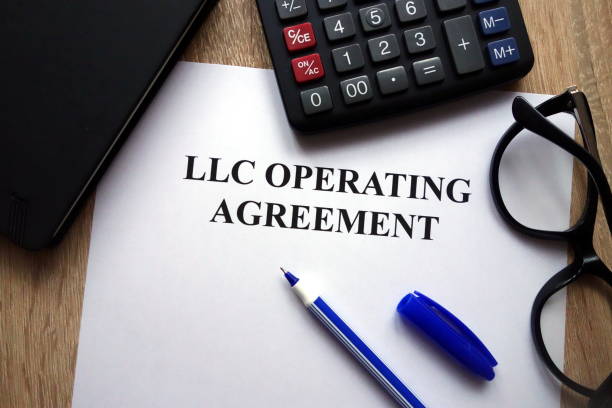A Limited Liability Company (LLC) is a type of business entity that combines the advantages of a corporation and a partnership. It offers the owners (known as members) protection from personal liability for business debts and legal actions.
Additionally, an LLC provides flexibility in terms of management and taxation. However, one crucial aspect of forming an LLC is creating an Operating Agreement. This document outlines the rules, regulations, and guidelines that govern how the business operates.
In this article, we will discuss when an LLC needs an Operating Agreement.
Overview of an LLC Operating Agreement
An Operating Agreement is a legal document that outlines the internal workings of an LLC. It is a contract between the members of the LLC that defines the rights and responsibilities of each member, the ownership percentages, the management structure, and the decision-making process. It also outlines the distribution of profits and losses and the procedures for adding or removing members.
An Operating Agreement is not mandatory in most states, but it is highly recommended. Without an Operating Agreement, the LLC will be governed by the default rules set by the state’s LLC laws, which may not be suitable for the members’ specific needs. Moreover, having an Operating Agreement can prevent misunderstandings and disputes among the members, which can be costly and time-consuming.
When is an Operating Agreement Required?
There are several instances when an LLC is required to have an Operating Agreement. Here are some examples:
State Laws Mandate an Operating Agreement
Some states, such as California, Delaware, Maine, Missouri, and New York, require LLCs to have an Operating Agreement. In these states, the LLC must file a copy of the Operating Agreement with the Secretary of State’s office when registering the business. Failure to comply with the state’s requirements may result in fines or penalties.
Multiple Members
If an LLC has multiple members, it is strongly recommended to have an Operating Agreement. With multiple members, there is a higher risk of disagreements and conflicts, which can be avoided with a clear and concise Operating Agreement. It will define the roles and responsibilities of each member, the decision-making process, and the distribution of profits and losses.
Single-Member LLCs
Single-member LLCs are not required to have an Operating Agreement in most states. However, it is still recommended to have one. It can protect the owner’s personal assets by clearly separating the business assets from personal assets. It can also define the management structure and decision-making process, which can be helpful if the LLC expands to include additional members in the future.
Changing the Management Structure
If an LLC wishes to change its management structure, it must amend its Operating Agreement. For example, if a member wants to transfer their ownership percentage or leave the LLC, the Operating Agreement should outline the procedure for doing so. Similarly, if the LLC wants to add or remove members, it should be reflected in the Operating Agreement.
Applying for a Bank Loan
If an LLC applies for a bank loan, the lender may require an Operating Agreement as part of the application process. The lender wants to ensure that the LLC is a legitimate business and that the members are aware of their responsibilities and obligations.
Benefits of Having an Operating Agreement
Having an Operating Agreement can provide several benefits to an LLC. Here are some of the advantages:
Protection of Personal Assets
One of the primary benefits of having an Operating Agreement is the protection of personal assets. It can help separate the LLC’s assets from the members’ personal assets, preventing them from being held liable for the LLC’s debts and legal actions.
Clear Guidelines and Rules
An Operating Agreement provides clear guidelines and rules for the LLC’s management and decision-making process. It defines the roles and responsibilities of each member, the ownership percentages, and the distribution of profits and losses. It also includes a buyout clause that can be used if any member decides to sell their ownership interest.
Avoidance of Disputes and Conflicts
An Operating Agreement can prevent disputes and conflicts among the members by establishing clear procedures for resolving issues. It can outline how decisions are made, how profits and losses are distributed, and how conflicts are resolved. Having these guidelines in place can prevent misunderstandings and disagreements that can damage relationships and the business.
Flexibility in Management and Taxation
An Operating Agreement can provide flexibility in management and taxation. It can specify the management structure of the LLC, such as who has decision-making authority and how votes are cast. It can also specify the tax treatment of the LLC, such as whether it will be taxed as a partnership or corporation.
Attraction of Investors
Having an Operating Agreement in place can make an LLC more attractive to investors. Investors want to know that the LLC has clear guidelines and rules for decision-making, management, and profit distribution. They also want to know that their investment will be protected, and an Operating Agreement can provide that assurance.
Conclusion
In summary, an Operating Agreement is a crucial document for any LLC.
It outlines the rules, regulations, and guidelines that govern how the business operates, and can prevent misunderstandings, disputes, and conflicts among the members.
While it may not be required in all states, it is highly recommended for all LLCs. An Operating Agreement can provide protection for personal assets, clear guidelines and rules, flexibility in management and taxation, and attract investors.
It is essential to consult with an attorney to draft a comprehensive and effective Operating Agreement that meets the LLC’s specific needs and requirements.


